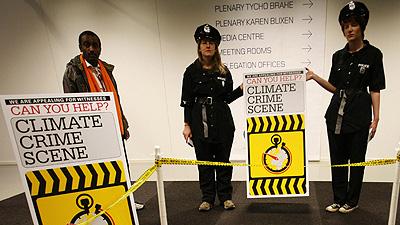Protests, walk-outs and stifled progress – Copenhagen so far

Talks at the Copenhagen climate conference were suspended for a period today after a coalition of developing countries withdrew their co-operation. The crucial talks, which had just resumed after a weekend break, were disrupted when the African countries, supported by the G77 and BASIC bloc, staged a walk out, angered that the conference was weakening in support for the Kyoto Protocol. Although, negotiations have since resumed, today’s debacle is just another episode in a conference plagued by drama, bravado and very little real progress.
The countries that suspended co-operation today are those which make up the G77-China bloc of 130 nations, which ranges from wealthy countries such as South Korea, to some of the poorest and underdeveloped states in the world.
This group accused richer, developed nations of trying to renege on the Kyoto Protocol on carbon emissions.
Jeremy Hobbs, Executive Director of Oxfam, said today: “Africa has pulled the emergency cord to avoid a train crash at the end of the week. Poor countries want to see an outcome which guarantees sharp emissions reductions yet rich countries are trying to delay discussions on the only mechanism we have to deliver this - the Kyoto Protocol”.
A crisis meeting was held this afternoon between Ministers from the aggrieved states and the President of the 15th Conference of Parties, Connie Hedegaard, where they expressed their dissatisfaction and demanded an assurance that urgent attention would be given to the Kyoto Protocol, especially to unambiguous emission reduction targets for the second commitment period. As a result, Hedegaard guaranteed that the conference would proceed in a "fully transparent" manner without any "surprises" and negotiations resumed this afternoon.
Even before the 15,000 delegates from 192 states descended on Copenhagen for what has been described as the 'last chance' to avert a catastrophic rise in global temperatures, the conference had been smeared in controversy. Hundreds of leaked emails from the University of East Anglia's Climatic Research Unit (CRU), allegedly stolen by hackers, were published online at the end of last month leading to climate-change deniers claiming them to be evidence that scientists have been concealing and manipulating data to support the concept of human involvement in climate change.
In the aftermath of the leak, the UK government's chief scientist alleged that the documents were deliberately leaked to undermine the Copenhagen talks. So called ‘climate gate’ has led to the head of the climate research unit stepping down from his post pending an enquiry and the university agreeing to make all the data publicly accessible.
The repercussions of the leak linger however. On the opening day of the Copenhagen summit, Saudia Arabia said that trust in climate science had been "shaken" by leaked emails and called for an international investigation into climate change research.
On Wednesday last, three days into the conference, the talks were thrown in to disarray after developing countries reacted furiously to the ‘Danish text’, a secret draft agreement worked on by a group of individuals known as "the circle of commitment", understood to include the UK, US and Denmark. The documents, leaked to the Guardian newspaper, revealed a plan to get world leaders to sign an agreement that effectively denotes more power to rich countries and sidelines the UN's role in all future climate change negotiations.
Any such agreement is basically a reversal of the Kyoto principle that rich nations, which have emitted the majority of the CO2, should make firm and binding commitments to reduce greenhouse gases, while poorer nations do not have as much responsibility. The document was also interpreted by developing countries as setting unequal limits on per capita carbon emissions for developed and developing countries in 2050, resulting in individuals in rich countries being permitted to emit nearly twice as much carbon.
There were angry outbursts from representatives from African NGOs attending talks over the draft on Tuesday afternoon. The delegates shouted and stood on tables to demand a more equitable deal. Although the Danish host of the conference immediately went on the offensive, arguing that the text could be one among many and pledging that it didn’t represent the official government position, the leak overshadowed the midweek proceedings.
Thursday and Friday passed without any major scandals but also without any significant progress.
The weekend was marred by controversies surrounding the protests. During a mass rally in Copenhagen on Saturday, intended to put pressure on the UN climate summit to take stronger action, police arrested almost 1,000 people. Most of the main Copenhagen rally was peaceful, however police moved in when hundreds of youths clad in black threw bricks and smashed windows. Similar rallies were held around the world from the Arctic circle to Australia to call on leaders to take action.
The negotiations are now entering their final phase. By Friday, US President Obama and about 115 other world leaders will gather for a united purpose: to make their impact felt on the international climate change negotiations. However, with only four days remaining before world leaders are due to sign a deal in Copenhagen, three fundamental issues remain unresolved; the level of emissions reduction targets, financing for the developing world, and compliance. Today’s walkout is yet another ominous sign that the summit hailed as one of the most important in history, is going to fail to deliver any solid agreement at all.
